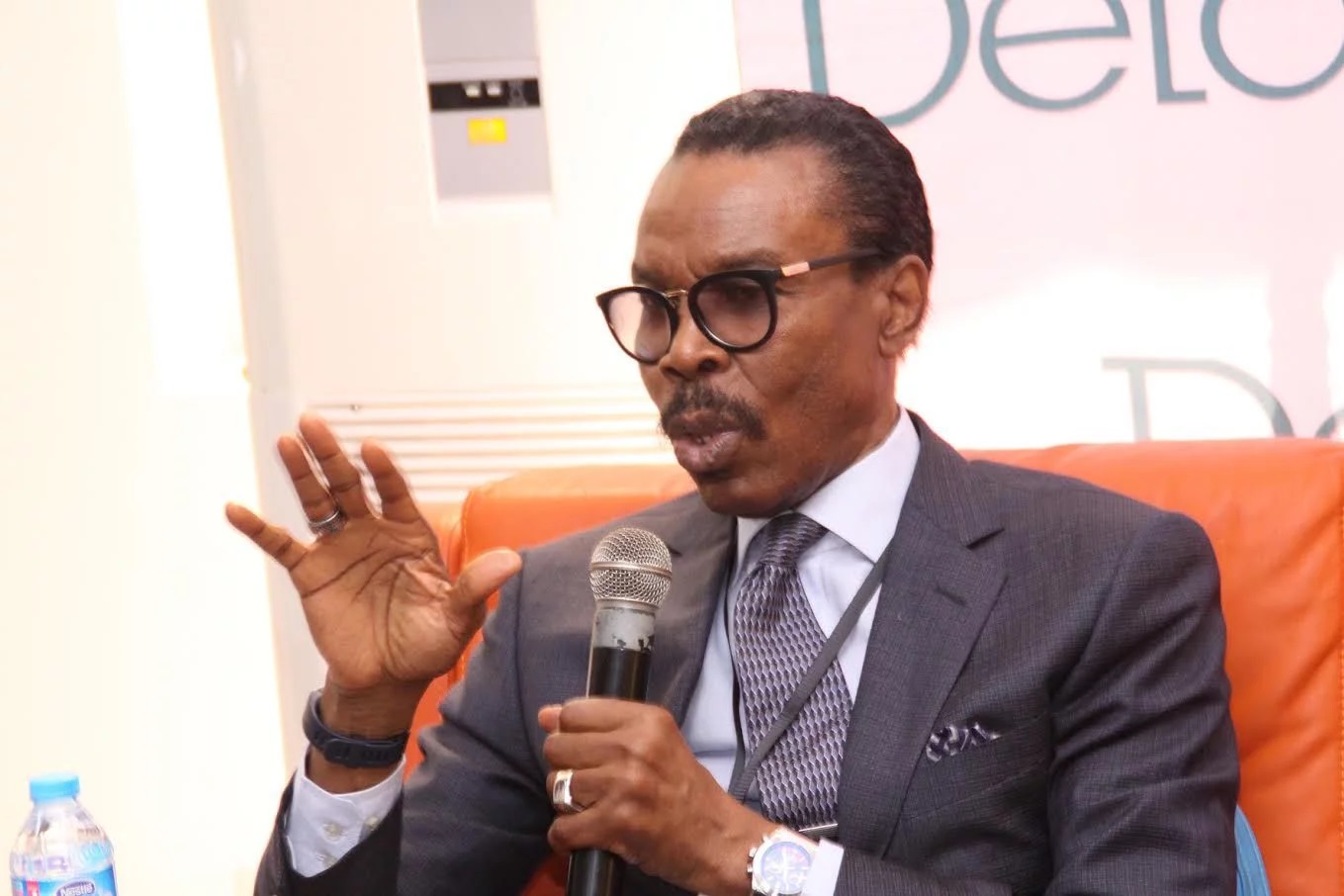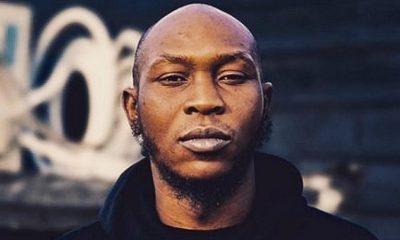Economy
Rewane Says Naira Appreciation Is Sustainable

The Managing Director/Chief Executive Officer of Financial Derivatives Company Limited Bismark Rewane believes better days are ahead for the country’s currency, the naira.
On Wednesday, the naira closed trading at 1,410/dollar at the parallel market and N1,475 at the official Nigerian Autonomous Foreign Exchange Market, according to data compiled from the FMDQ Securities Exchange.
Although the country’s currency had fallen sharply against major currencies in recent months, Rewane, who was a guest on Channels Television’s Politics Today which aired on Thursday, said the appreciation of the naira is sustainable.
“The truth is that it is sustainable as long as you do a number of things,” he said when asked by the presenter, Seun Okinbaloye if the recent appreciation of the local currency is sustainable.
“One is that interest rate has been increased therefore the propensity to save has increased and the propensity to consume has actually reduced. People are consuming less and saving more if they are saving.”>
But he is unhappy with the government’s management of resources.
“The government itself is consuming less and saving more. You heard that there is a ban on travel,” the economist added.
“At the same time, there is a lot of waste in government, there is a lot of leakages in government and mismanagement of things.”
Trust Deficit
According to him, the current administration should roll up measures to make mint more money in circulation.
While noting that there is a trust deficit, Rewane said there should be consistency in the government’s policy to build confidence in the citizens.
He said, “There is a need for new money, new money is a function of confidence. Confidence is a function of consistency in policy. These are the things that the administration has to come to terms with.
“We have a trust deficit in this country as policymakers. When we say today, the next day we change. There is no consistency. The truth is that when people begin to see consistency, they stop panicking.
“When they stop panicking, they buy less in quantity but over a longer period. So you will now begin to see the prices of those commodities, even like diesel which is now down to like N1,450.”
Economy
75.5% of rural Nigerians now live below poverty line — World Bank

The World Bank has disclosed that a staggering 75.5 per cent of rural Nigerians are now living below the poverty line, reflecting deepening hardship in the country’s hinterlands.
This was revealed in the Bank’s April 2025 Poverty and Equity Brief for Nigeria, which paints a grim picture of worsening economic hardship, widening inequality, and persistent underdevelopment across much of the nation.
While poverty is widespread among urban populations, the report emphasised that the situation is significantly worse in rural areas, where economic stagnation, high inflation, and insecurity have exacerbated living conditions.
“Based on the most recent official household survey data from Nigeria’s National Bureau of Statistics, 30.9 per cent of Nigerians lived below the international extreme poverty line of $2.15 per person per day in 2018/19 before the COVID-19 pandemic,” the report stated.
The report also highlighted Nigeria’s enduring regional disparities. “Nigeria remains spatially unequal. The poverty rate in northern geopolitical zones was 46.5 per cent in 2018/19, compared with 13.5 per cent for southern ones. Inequality measured by the Gini index was estimated at 35.1 in 2018/19.
“Nigeria’s Prosperity Gap — the average factor by which individuals’ incomes must be multiplied to attain a prosperity standard of $25 per day for all — is estimated at 10.2, higher than most peers.”
Despite successive policy interventions, these figures underscore a persistent economic divide across the country.
The report’s demographic analysis found that children aged 0 to 14 years had a poverty rate of 72.5 per cent, reflecting the scale of deprivation among the youngest segment of the population.
Gender disparities were also observed, with 63.9 per cent of females and 63.1 per cent of males classified as poor under the $3.65 per day lower-middle-income threshold.
Education emerged as a significant determinant of poverty, with Nigerians lacking formal education experiencing a poverty rate of 79.5 per cent. This contrasts with 61.9 per cent for those with primary education and 50.0 per cent for secondary school graduates. Only 25.4 per cent of those with tertiary education were considered poor.
The report also drew attention to multidimensional poverty indicators, which further reflect widespread deprivation.
According to the World Bank, about 30.9 per cent of Nigerians live on less than $2.15 daily, 32.6 per cent lack access to limited-standard drinking water, 45.1 per cent do not have limited-standard sanitation, and 39.4 per cent have no electricity.
Education access remains a challenge, with 17.6 per cent of adults yet to complete primary education, and 9.0 per cent of households reporting at least one school-aged child not enrolled in school.
The report noted that even before the COVID-19 pandemic, efforts to reduce extreme poverty had largely stalled.
“Before COVID-19, extreme poverty reduction had almost stagnated, dropping by only half a percentage point annually since 2010. Living standards of the urban poor are hardly improving, and jobs that would allow households to escape poverty are lacking,” the report read.
Although the World Bank acknowledged recent economic reforms aimed at stabilising Nigeria’s macroeconomic outlook, it warned that persistently high inflation continues to undermine household purchasing power, particularly in urban areas where incomes have not kept pace with rising costs.
In light of the worsening situation, the Bank called for urgent policy action to shield vulnerable groups from inflationary shocks and to drive job creation through more productive economic activities.
Economy
Naira Records Marginal Decline Against Dollar at Official Market

The Nigerian naira experienced a mild drop in value on Friday, closing at ₦1,602.18 per dollar in the official foreign exchange market, based on figures released by the Central Bank of Nigeria (CBN).
This marks a decrease of ₦5.49 from the rate of ₦1,596.69 recorded on April 30, the last trading day before the May 1 Workers’ Day holiday—indicating a depreciation of approximately 0.34%.
Earlier in the week, from Monday to Wednesday, the naira remained relatively stable, exchanging at ₦1,599.95, ₦1,599.71, and ₦1,596.69 respectively.
Although the local currency showed some consistency mid-week, it wrapped up the week with a loss, following a sligh dip of 0.02% at the beginning of the week
Economy
Black Market Dollar hits N1,610 Amid Economic quagmire

What is the Dollar to Naira Exchange Rate in the Black Market (Also Known as the Parallel Market or Aboki FX)?
Below is the black market exchange rate for the U.S. dollar to the Nigerian naira as of Thursday, May 1, 2025. These are the typical rates at which you can exchange dollars for naira:
Dollar to Naira Black Market Exchange Rate (May 1, 2025):
At the Lagos Parallel Market, also referred to as the black market, Bureau De Change (BDC) operators are buying dollars at ₦1,602 and selling at ₦1,610, according to market sources.
Please note: The Central Bank of Nigeria (CBN) does not recognize or endorse transactions conducted on the parallel market. The CBN advises individuals and businesses seeking foreign exchange to use official banking channels.
-

 News5 hours ago
News5 hours agoWhy ‘VeryDarkMan was arrested – EFCC
-

 Economy15 hours ago
Economy15 hours ago75.5% of rural Nigerians now live below poverty line — World Bank
-

 News16 hours ago
News16 hours agoMassive turnout as Bishop David Abioye holds first service in new church + Video
-

 News16 hours ago
News16 hours agoHow US-Based Yoruba Monarch Died After Brutal Assault In Oyo Palace, Allegedly Ordered By Alaafin Amid Supremacy Row With Ooni Of Ife
-

 Education7 hours ago
Education7 hours agoOver 1.5m candidates score less than 200 in 2025 – UTME
-

 Entertainment5 hours ago
Entertainment5 hours agoHow I narrowly escaped death in U.S hotel room – Seun Kuti
-

 News7 hours ago
News7 hours ago‘S3x is good, I enjoy it,’ Bishop Adejumo tells wives
-

 News15 hours ago
News15 hours ago‘Cabals’ still fighting against our refinery — Dangote






